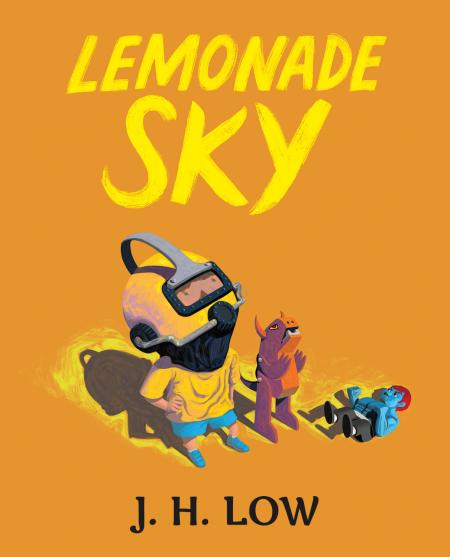Lemonade Sky
By J.H. Low
HABA2022 Picture Book Category Winner
A powerful story that will move readers of all ages to think about what it means to truly be free. What is it like to fly in the sky? A boy and his faithful friends take a journey of self-discovery in this captivating crossover picture book full of arresting illustrations. In a society that has everything mapped out for him, the boy yearns for a place where he can be himself. Faced with gatekeepers and obstacles, can he succeed?

J.H. Low (Author & Illustrator)
J.H. Low has a degree in fine art, a MA in Children’s Illustration, and a PhD (in The Expressive Potential of the Picturebook Form). A 2016 finalist for Best Children’s Title in the Singapore Book Award and the first runner-up for the 2019 Scholastic Picturebook Award, J.H. Low is known for his masterful artworks and creative narratives. His recent picturebook Lemonade Sky is featured in the White Ravens catalogue 2021. His latest published book Mr Goodchild, is a cryptic graphic novel that revolves around the life of an anthropomorphic goat.
Feature Interview
We unpack what the "lemonade sky" actually means with author-illustrator J.H. Low, and how we can encourage our children to look for their own. Somewhat auto-biographical, Lemonade Sky draws from J.H. Low's own experiences and memories when he was a child.
How would you define what Lemonade Sky is?
When I was thinking about the title Lemonade Sky, it wasn't something that came immediately. So actually, I have kind of finished the book, before I even started thinking about the title. So when the book was done, I was thinking, “what was this book about?” and what would be an appropriate title.
I think this book is about a boy who is kind of lost, and wandering around somewhat aimlessly, and trying to look for some kind of answer. I think he was finding himself in quite a restrictive environment and in a situation that he wanted to break free. So I thought about the old saying, “when you're given lemons, you make lemonade”. I think that was one of the reasons I used the title Lemonade Sky. And when the boy is put in a situation, he is within his means trying to find the best solution possible for himself.
And you know, sometimes we the adults sometimes impose so many expectations on children. In one instance that I recall, I had some kids drawing in an art class, and I overheard a teacher saying this to the child that the sky should be blue. And the child was originally quite happily using yellow crayon just trying to color the sky in yellow. Upon hearing the teacher's comment, the child somewhat reluctantly dropped the yellow crayon and used a blue crayon to colour the sky.
I remember thinking then why couldn't the sky be yellow, why couldn't the sky be pink, why couldn't the sky be any colour of the child's liking? And I thought, some of these experiences kind of came around when I was thinking about the title and in the end, I decided on “Lemonade Sky”.
What would you like children and your readers to take away from this book?
I see Lemonade Sky as a crossover book. What the crossover book means is, it's not really just for children. And obviously, I hope many children like the book, but I think even adults or older teenagers will be able to enjoy the book and get something out of it.
I think all of us whether we are young children or older adults will have certain moments when we feel lost. I think Lemonade Sky is a book that makes us reflect about what we thought when we feel lost. How can we conjure some kind of response to the sensation of loss as there will be a lot of things that result in us having that feeling, that sensation of loss?
Maybe it’s the environment that we are in. Maybe it’s some of the restrictions, limitations that we find ourselves confronted with? I think Lemonade Sky is about that. I can’t really say for sure what I hope the reader can take away from Lemonade Sky, I actually hope the readers make up their own opinions about how they would like to interpret Lemonade Sky. The book can somehow be a little bit cryptic, but at the same time, familiar, and that is how some of my readers described it to me.
In the future, would you like to continue creating content for children? And if so, what kind of content are you looking to create for children?
I suppose, because I like picture books very much. And I find it a very interesting medium to convey narratives, to do storytelling, and I find it very much a tool where I can actually connect to readers.
Unfortunately, I think the appetite for picture books among the the older children or adults is not very strong in Singapore, so I would certainly be very much still looking forward to creating picture books for younger children in Singapore. I can't say for sure what it is I want to do at this point, I think sometimes, you just have to wait for things to happen in some kind of serendipitous way. If there's some inspiration that comes around, I would definitely want to create a story out of it.
Normally I go through life experiences, like a routine, right? But from time to time, you never know where the inspiration may come calling. Sometimes it’s when you're watching a movie, sometimes when you read a book, sometimes, when you are just spacing out on the bus. The idea may just jump by and it is during moments like this, that I will quickly you know, just jot down the ideas to my mobile phone, and then park that idea somewhere. And then when there's enough motivation, I will start to make sketches and and look hopefully produce a future book.
Is there anyone who inspired this character?
I think in a way, it's almost autobiographical because when I was doing Lemonade Sky, I was also reflecting upon my own situation and my recollection of my childhood days. I remember those days, it was many years ago in the 1980s or even 1970s as a child because both my parents were very busy working.
I recall those days,when our family had just moved into a newly built HDB estate. A lot of the HDB blocks in those days were very dry, very uninspiring, they were just rectangular blocks. As a child I remember roaming around those blocks. I spent a lot of time just walking around the streets aimlessly. But there are certain feelings of loneliness, a feeling of very stale, things are not moving.
But at the same time, there's also some kind of freedom, some kind of pursuit for liberty. I remember climbing up and seeing a lot of things that are quite random. I think that was the feeling I had when I created Lemonade Sky. It was aimless and conflicting thoughts flying all over the place. In Lemonade Sky, the child was going through buildings, going through hawker stalls, going through car parks and empty roads. I think some of these images, although not the exact copy of my own experiences from my own childhood and my own experiences, had a lot of influence on how I actually make up Lemonade Sky.
On that note, how do you think we can encourage our children to be free and fly in their own Lemonade Sky?
Very good question.
I don't think there is a formula to encourage students, or children to be free. I think it's probably a cultural thing, and I think we can start by telling these children about stories, because the world of stories is fascinating.
Anything goes, and especially when children are young and impressionable, sharing as much, sharing as many stories to them as possible, I think it's a wonderful way to broaden their imagination. Stories, a lot of times, especially children's books may come across as quite simplistic for the adults. But if we start to think from the perspective of a young child, the world of the stories can be very real to them.
I think just sharing stories, encouraging the child to imagine, to be able to ask questions, to be able to speak up is a good way to encourage them to be more free, to be more bold about forming their own opinions about things. And as they get older, it is also a very good lead-in to encourage them to read more. I think our children really need to read more. There is so much insight and so much interesting knowledge in this world that we really want to do more to encourage reading among our younger generation.
I'll move on to the illustration side of things. Maybe you can tell us more about the illustration style of Lemonade Sky. Did you try something new or a different colour palette?
When I was making Lemonade Sky, one thing that struck me was that it is a very time-consuming and laborious process. Every page without taking into consideration the narrative, the thinking behind the words, just the actual labour time to create a drawing, is quite substantial. It could take me easily between four days to a week, working on it full-time, just to create one page. Every page was really being treated with a lot of tender loving care.
I will say the style is maybe something that looks painting-like. I used a digital tablet to do it, mainly because I don't have a lot of studio space to work with. The computer desk that I have at home was the most practical way to do it. I was learning things on the fly, because while digital painting provides a lot of convenience, at the same time they could easily or if not done properly, create images that are very familiar, computer-ish, lacking character or novelty.
So I use a computer tablet, but at the same time, I am also trying to get to know the medium that I have, and how to create something that is more personal, something that is more expressive with the tools that I’m given. So I can't say for sure how the styles evolve. But I can only say that it's a lot of trial and error, it’s a lot of experimentation, it’s a lot of exploration.
And I think like all artists, we try, we play around with the medium, and then we settle with something that we feel calls out to us and, if …well, I'm not sure whether I still keep the earlier sketches that I had of Lemonade Sky, but there is actually certainly some… it took quite a while for for the style to evolve to what it looks like today. Yeah.
...if we really want to convey something that is more intuitive, something that is more evocative, something that we can't fully describe with the daily words or the common language that we use, then we really need to be very thoughtful about what we are dealing with.
I think you also mentioned earlier when I was interviewing for the key visual as well and earlier in this interview, that you like picture books a lot. So what do you think is the draw of picture books for the public, but also for children as well?
I think my love of picture books stems from my love for art and visuals primarily, I mean, picture books are like, to some extent, a collection of many paintings. You string them together to form a narrative. So it's something very simple, seemingly, but actually very complicated and complex.
It’s almost like the poem form of visual art. Just like when you write a poem, you only use very few words, in a few stanzas, but you are able to conjure something very evocative, something that touches the heart.
I think for good picture books, it is the same thing. It may not take people a long time to read it but from the creator point of view, from the author, illustrator point of view, if we really want to convey something that is more intuitive, something that is more evocative, something that we can't fully describe with the daily words or the common language that we use, then we really need to be very thoughtful about what we are dealing with.
So being very intentional about how we create our illustration, what sort of words we want to use, with the illustration, and every page, how do we create novelty, both in the art style, but to encourage the readers to want to turn the page to advance the narrative. So all these need to come together.
And for me, that is always very challenging. So while when it's almost like when people look at the finished product, they they might not really know all the heart and sweat and blood that goes behind the work. So yeah, that's what a picture book is to me and I love it. I mean, it's agonizing going through the creative process. But because it's so agonizing, when you finally come up with something that you are happy with, it makes that the fulfillment all the more sweet.
What kind of picture books would you want to create in the future?
I recently also published another book called Mr. Goodchild. It's also a picture book, but it's more a picture book for older readers. It explores issues that are more existential, more topics that are more for adults.
Right now, I'm working on and almost completing another picture book, which is called The Visitor. It’s also exploring human relationships. The thing is, I like to explore feelings, emotions that we all experience, but it’s kind of in a very strange space where we can't really talk about these experiences.
We don't often think about these experiences in a very conscious way. For example, “how do people meet? We meet so many people everyday in our lifetime, but why is it that some people come together and others just pass by each other as strangers? And when we come together, what makes us tick? We become friends and then sometimes we have quarrels and when some quarrels are just banter, they're fine. But some could result in a more severe or negative outcome.
Sometimes people quarrel until they part ways; I think we don't often talk about these sort of experiences. What causes them and what, how, as human beings, we respond to emotions of this nature. So I think The Visitor, the picture book that I'm working on now, is about that. It's about exploring human relationships. I hope that through reading the picture books, I get the readers to be more introspective to be able to feel like there's some familiar feelings that the book has evoked in them and get them to be able to reflect on some of these issues.
Look out for J. H. Low’s upcoming works!

